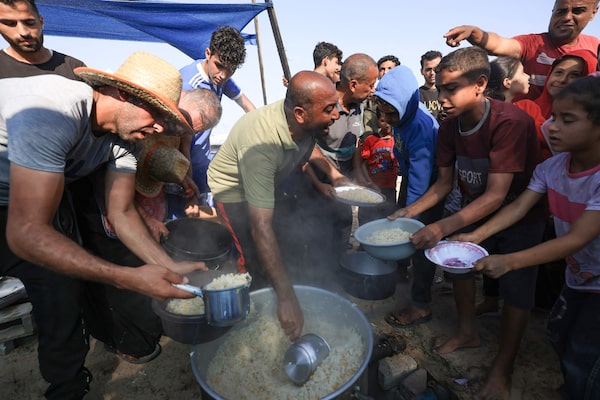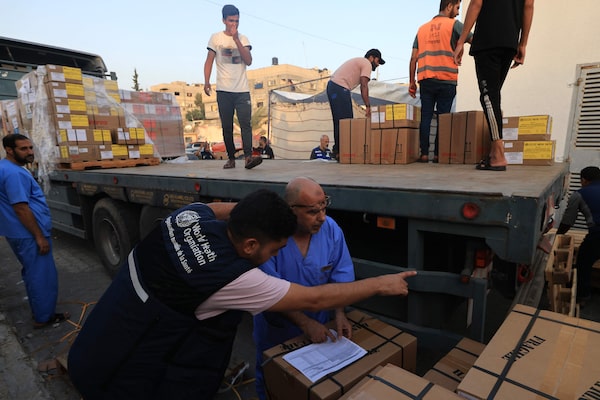
People distribute food at a makeshift camp for displaced people in Khan Yunis, in the southern Gaza Strip, on Oct. 25.MAHMUD HAMS/AFP/Getty Images
With aid convoys stalled and dwindling, and Gaza on the verge of civil disorder, a senior United Nations official says the Palestinian territory and its humanitarian workers are victims of a system that was “set up to fail.”
Philippe Lazzarini, the head of the UN agency for Palestinian refugees, known as UNRWA, told The Globe and Mail that some of Gaza’s two million people will soon be dying from Israel’s siege of the territory, not just from the relentless bombardments that have reportedly killed thousands. Water, food, fuel and medicine are all nearly exhausted.
Mr. Lazzarini described a riot that erupted Thursday in a southern district of Gaza after people were falsely told in text messages that the UN would be distributing food there. “Civil order is breaking down,” he said. “People are just completely desperate.”
Aid agencies were able to get 40 trucks of relief supplies into Gaza from Egypt last weekend, and Western leaders said that was just the beginning, with an increase in the daily number of trucks expected. Instead, the number has dropped, with only 34 trucks entering the territory over four days this week. Aid trucks have routinely been held for many hours at Israeli inspection zones, with Israel saying it must ensure that no weapons or fuel are reaching Hamas fighters.
Before this war, Mr. Lazzarini noted, Israel was able to inspect about 500 trucks daily at the Kerem Shalom crossing between Israel and Gaza. “So why does it take so long now for a handful of trucks?” he asked.
“It’s a very good question. There is certainly a lack of will. If there was a will, we would have much more. … The system in place today is set up to fail.”

Workers unload medical aid from the World Health Organization at the Nasser hospital in Khan Yunis in the southern Gaza Strip on Oct. 23, 2023.MAHMUD HAMS/AFP/Getty Images
The Kerem Shalom crossing was one of the six points at which Hamas militants crossed into Israel during the Oct. 7 attacks. A Globe request to visit the facility and see the damage done was rejected this week by the Israeli military, which said the situation there was too dangerous.
Western governments, including Ottawa, acknowledged that the first two days of aid convoys, with a total of 40 trucks, were a small fraction of what Gaza needs. The UN has estimated that a bare minimum of 100 trucks of relief supplies is needed every day. That number is actually rising, as what remains of Gaza’s civilian infrastructure continues to collapse and demands on UNRWA grow.
“Everything is crumbling and collapsing,” Mr. Lazzarini said. “People are struggling the entire day to try to find some clean water. Sooner or later, under our watch, we will see people dying not just because of the bombardment but also because of the impact of the siege being imposed on the population of Gaza. How is this possible, when this is unfolding live, 24 hours a day, on all possible media, social media and television?”
The world’s focus on a small number of aid trucks is “almost disgraceful” when it is abundantly clear that the convoys are a tiny percentage of what is needed to avert deaths from starvation or dehydration, he said. The siege has resulted in the “collective punishment of an entire population.”
“You have a weakened community of the people. They are completely exhausted after two weeks of war. Many of them are displaced two or three times. They don’t find clean water or proper food.”
UNRWA had warned that it would have to halt its humanitarian operations in Gaza if it did not receive fuel supplies by Wednesday night. It was able to push the deadline back by tightly rationing its use of fuel, he said.
“We have given less to hospitals, given less to bakeries, and that has allowed us to go one or two more days. Maybe we will decide not to go to our shelters every day, just to add one day or two. But we are coming to the end. We’ve done all possible to ration our limited remaining resource. We have agonizing decisions all the time. We are on the edge of a breakdown of our operations.”
Israel has said it will not allow deliveries of fuel to Gaza, accusing Hamas of stealing fuel from UNRWA. Mr. Lazzarini said his organization had protested the accusation “very vehemently.”
He said the riot Thursday was a foreshadowing of an increasingly dangerous mood. Palestinians gathered at an UNRWA warehouse in Rafah after receiving misleading text messages telling them aid would be distributed there. Anger erupted when it became apparent they had been deceived and no supplies would be handed out.
Mr. Lazzarini said he didn’t know who sent the text messages, which he said had come from a Palestinian mobile phone number. “People have nothing. They are told to come, we don’t give. What would you do? You have your family, and they know we are running out. The temperature is rising.”
He said the crowd began to “blame the ambulance” and direct their anger at UNRWA because of the increasingly meagre support the agency is able to provide. Some 613,000 people are currently sheltering at 150 UNRWA schools and other buildings around the territory.
Six people were killed in an UNRWA school that was hit on Oct. 17. Mr. Lazzarini said it wasn’t possible in the middle of the war to assess who had been behind the attack. He said he had not received any reports from his staff of Hamas firing from, in or near UNRWA facilities.
He added that the situation in the West Bank, the other half of the Palestinian Territories – which he characterized as “already boiling” before Oct. 7 – was also deteriorating rapidly. He described a dangerous mix of economic pain, as Palestinians who work in Israel have lost their jobs since the Hamas attacks, alongside a rising number of attacks on Palestinians being carried out by Jewish settlers who live in illegal settlements in the occupied territory.
“All this is a recipe for more violence,” Mr. Lazzarini said, pointing out that October has already seen the highest death toll among Palestinians in the West Bank in two decades, since the height of the last intifada. More than 90 West Bank Palestinians have died in clashes with Israeli security forces since the start of the war in and around Gaza.
UNRWA was established after the 1948 war that led to the establishment of the state of Israel and saw its mandate expanded following the 1967 and 1973 Arab-Israeli wars. It now provides basic services to more than 5.6 million Palestinian refugees and their descendants in Gaza and the West Bank, as well as in decades-old refugee camps in Lebanon, Jordan and Syria.
Mr. Lazzarini said the hardest part of his job has been managing the organization while 43 of UNRWA’s 13,000 staff members have been killed over the past three weeks, a number he said roughly correlated with an overall situation that has seen more than 7,000 Palestinians killed, according to the Ministry of Health in Hamas-ruled Gaza.
Just like the rest of Gaza, UNRWA staff have lost homes and families, and many have become aid recipients themselves.
“It’s deeply distressful to see so many colleagues, not just our staff [who have died] but all the other staff who have lost kids, have lost relatives. It’s just endless,” he said. “You feel powerless. Your word is not enough any more. Being UN is not enough any more to bring safety. You feel that Gaza is definitely a place where there is no safe place for anyone.”
 Geoffrey York
Geoffrey York Mark MacKinnon
Mark MacKinnon